According to a study carried out by EY, the 2023 Rugby World Cup will generate a total expenditure of 1.8 billion euros and contribute 871 million euros to the French national economy, especially thanks to the 425,000 international visitors who attended the event. In addition to the economic aspect, this success also extends to the social, environmental, sport, media and cultural sectors, although, despite efforts, challenges remain in terms of environmental impact.
Rugby World Cup 2023 is a real economic driver for France
With almost 2.4 million tickets sold, it equalled the number of participants in the UK in 2015 and surpassed the number of participants in Japan in 2019. This impressive figure brought total spending to €1.8 billion, of which €871 million directly benefited the French economy through international visitors. Around 85% of this added value came from the tourism sector, including transport, accommodation, catering and attractions.
The event attracted around 425,000 international tourists, accounting for 41% of the total spectators. The direct economic impact amounted to €585 million, mainly benefiting the accommodation and food and beverage industry. In addition, hosting the World Cup stimulated employment, with around 5,200 jobs being created in 2023. Despite public expenditure of €70 million, tax revenues generated by international tourist spending and services provided by the organizers reached €84 million, mainly thanks to VAT and tourist taxes.
Rugby World Cup 2023 will have a beneficial impact across France, reaching far beyond the borders of the host city.
Around 39% of the economic impact generated by the event benefited towns and cities that did not host any of the 48 matches played, demonstrating a significant spread of secondary effects. Moreover, more than 30% of Rugby World Cup visitors spent at least one night outside the host city or town, a much higher percentage than recorded at UEFA Euro 2016. This regional spread is the result of the longer duration of the event (51 days compared to 31 days for UEFA Euro 2016) and the greater number of host cities (10) and base camps (20) scattered across the country. Paris, Saint-Denis and Marseille gained 28% of the economic impact from hosting the prestigious match, while the other host cities benefited from 33% of the secondary effects. Beyond these regions, coastal areas, wine tourism and heritage areas also benefited from the positive impact of the event, thanks to activities such as broadcasting, events, tournaments and exhibitions organized by rugby promotion organizations, local authorities and France 2023 partners.
Rugby World Cup 2023 stands out for its success in terms of inclusion, thanks to an ambitious CSR strategy that has made it possible to involve people who are often far removed from employment and rugby.
The programmes developed as part of this strategy have directly benefited around 160,000 people, in particular unaccompanied minors, young people from disadvantaged areas and people with disabilities. Some of these initiatives should be sustained after the event to ensure a lasting legacy, notably through the survival of the Rugby au Coeur Fund within the FFR. The 7,000 volunteers mobilised for the event (including 4,400 for France 2023) also played an important role: almost half of them believed that the skills they acquired at the Rugby World Cup would help them in their professional careers, with this percentage even higher among young people and those far from employment. Moreover, the event sparked a more sustained commitment to volunteering, with almost all volunteers expressing their desire to participate again in the coming months. In recognition of these efforts, France 2023 was awarded the government’s first “Equal Opportunities Foundation” label, highlighting the organisation’s commitment to promoting inclusion and equality at all levels.
Rugby’s image in France has been boosted by the 2023 Rugby World Cup.
A survey conducted by Odoxa in September of the same year showed that the majority of French people shared this positive impression, with 84% saying they had a good image of the sport. There was also a notable change in the composition of the audience, with more female spectators in the stadiums, making up almost a quarter of the audience, a significant increase compared to UEFA Euro 2016. Furthermore, the tournament acted as a catalyst for female involvement in rugby, with 82% of female spectators saying they were inspired to try the sport.
However, despite these positive aspects, the actual economic impact of the event was lower than expected at the start of the bid, coming in at 690 million euros compared to a forecast of 910 to 1,124 million euros. This large difference is explained by a lower-than-expected average basket per foreign spectator and by the distribution of the hospitality program’s profits, which mainly benefited French spectators, whereas foreign spectators had been mainly expected.
Despite efforts by France 2023 to reduce and offset the Games’ carbon footprint, emissions reached 830 kilotonnes of carbon dioxide equivalent.
This footprint represents the average annual carbon dioxide emission of 90,000 French people. The use of existing infrastructure was a positive factor in terms of economic and environmental moderation and contributed to reducing the event’s overall carbon footprint. However, transportation was the main source of emissions, accounting for 94% of the Games’ carbon footprint.
Travel from visitors’ countries to France was mainly by air, accounting for 84% of total emissions, with the majority of this coming from long-haul flights. Due to the dispersed location of the host cities, planes were used both to travel to and within France, so 82% of the Games’ greenhouse gas emissions came from air travel.
The event’s global scale also meant that carbon emissions per capita, particularly from visitors from non-European countries, were significantly higher than UEFA Euro 2016. Despite an ambitious carbon offsetting programme, emissions from air travel were double original estimates, mainly due to the extended duration of the tournament.
Three measures have been proposed to reduce the environmental impact of Rugby World Cup 2023 while maintaining its economic benefits.
First, prioritizing European spectators when selling tickets reduces greenhouse gas emissions associated with long-distance travel. Second, optimizing travel between matches by grouping matches from the same pool in the same clusters. Finally, minimizing air connections by prioritizing cities accessible by train and providing direct services between the host city and the visiting team’s country. These strategies reduce the carbon footprint while maintaining the economic impact of the event.


